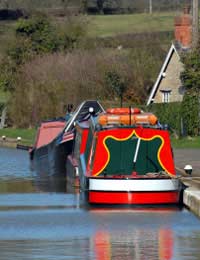British Waterways - Rules and Regulations

British Waterways are used by a large number of people each year many of whom are not even boaters. The waterways themselves and the areas surrounding them are enjoyed by walkers, anglers, cyclists and many other outdoor pursuits’ enthusiasts.
As such, they publish a number of different brochures to do with safety and guidance which point to different ‘rules’ more in terms of how to adopt best practice in terms of looking after both your own safety and protecting the environment. Here are some of the more important aspects pertaining to boaters.
Looking After The Waterways
It’s important that you take a keen interest in conservation and preservation if you intend boating on British Waterways. You should refrain from dumping rubbish, sewage or any oily bilge water into the natural water supply or onto a river or canal bank. Likewise, any other rubbish or materials you bring with you, you should take out with you and dispose of it in the proper manner so that you leave any site behind in the same way in which you found it.It’s also crucial that you don’t damage any vegetation or cause erosion to the canal or river banks. You shouldn’t light any fires and if you have a dog with you, make sure that it’s kept under control and that you clean up after it. Additionally, if you see any pollution and the likes of any fly tipping taking place or you see fish which are obviously showing signs of being in distress, you should inform the Environment Agency and the RSPCA or RSPB, if you are witness to any birds or animals in distress or the equivalent bodies in Scotland.
Permits
Always check with British Waterways first to make sure that you have the permission and any necessary permits for activities like fishing and cycling as well as your boating permit.Taking Care of Yourself & Your Children
British Waterways requests that you and any other person operating a boat understands how to operate it properly as well as knowing how to navigate tunnels, bridges and locks. It also requires any children along with any non-swimmers to always wear a life-jacket or some other kind of buoyancy aid and to supervise younger children at all times.Unless you’re informed otherwise, swimming is also strictly prohibited on British Waterways and you should have sufficient first-aid knowledge and appropriate first-aid equipment as well as having some understanding of what to do if you encounter an emergency situation.
Considering Others
When mooring up, pay attention to mooring pins and ropes and ensure that they are not a danger to anybody who may be using the towpath. Better still, make them conspicuous by using some kind of marker.You should also avoid causing obstructions at bridges, locks and other turning points and slow down when you’re passing moored boats or those which are unpowered in order to avoid creating a breaking wash of water. Remember to also turn off your propeller once you have safely moored up.
Considering Anglers
Pay close attention to any signs that have been put up regarding fishing competitions taking place in the area and when passing anglers reduce your wash whilst maintaining a steady pace in the centre of the water channel, unless the anglers advise you otherwise.You will have a far more enjoyable experience using British Waterways if you follow their guidelines and it’s easy to download particular publications from its own website which contain far more information relating to your specific needs.


Re: Common Reasons Why People Fail to Adapt to Life Aboard
Kak esehiko sminor k112 livingonaboat.co.uk
Re: Renting a Houseboat
Hello, Unlike most of the people on here I just want a friend who lives on a houseboat, anywhere in the U.K. Anyone?....form an orderly queue…
Re: Renting a Houseboat
Looking for static, long term houseboat rental in Oxford, single and responsible professional occupant
Re: Renting a Houseboat
Looking to get out the race . yearning for a boat to live on full time.rented just me and my mrs. Have a love for the river and canals. im…
Re: Renting a Houseboat
looking to rent out a narrow boat before the 5th of august as i have to move put my home by then
Re: Renting a Houseboat
my self and partner are looking for long term boat rental,with or without permanent mooring ,stourport , Stourbridge, Kidderminster,…
Re: Renting a Houseboat
myself and partner are looking for for a long term boat rental,stourport, Kidderminster,or Shropshire areas ,with or without permanent mooring
Re: Renting a Houseboat
My partner and I are looking for a boat to live on near norwich (15 miles or so) for at least a year maybe two or three if all goes well. Any…
Re: Renting a Houseboat
My partner and I are looking to rent a houseboat for 1 yr minimum around the Cambridge area we need to move back into Cambridge.
Re: Renting a Houseboat
Ex fisherman,,,would love too live long term on house boat